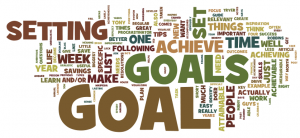This post begins a two part series on effective goal setting. It’s important to enter college with a clear understanding of what you want to accomplish, how you’re going to do it, and when you’re going to achieve it. Successful students and successful professionals share a common characteristic, they have clear goals that guide their actions. That’s why goal setting is the second chapter in this book.
As we begin our series on defining goals, let’s preface our discussion by asking the following question: Why are you attending college and what academic/personal goals do you plan to accomplish there? Maybe you’ve thought about this question before. You’ve probably written an essay on this subject for your college applications. From speaking with students, both Dr. Thum and I have noticed that students often respond to this question by saying: Well, I want to go to college to earn a degree so that I can get a good job. While this response is a great start, let’s look at an example of a more specific response.
To illustrate, we’ll ask hypothetical first-year student, Elizabeth Alvarez, what her academic/personal goals are. Now before we discuss Elizabeth’s response. It’s important to give some background information. Elizabeth is a first-year student at Dartmouth College, and she is very interested in physics. In-fact, she worked in a physics research lab during the summer before her freshman year. She hopes to one day become a professor in physics. Okay. Now that we’ve gotten to know Elizabeth a little better, let’s ask her: Why are you attending college and what academic/personal goals do you plan to accomplish there?
Elizabeth’s response: I am attending Dartmouth College because I want to pursue a degree in physics. Dartmouth College has an excellent physics department that will allow me to conduct research while taking classes. I intend to join Dartmouth’s Physics Society during my freshman year, as well as publish two physics research papers with a Dartmouth faculty member by the end of my junior year. By attending Dartmouth College, I will gain an excellent education and extensive research experience, which will allow me to attend graduate school and one day become a physics professor.
From reading Elizabeth’s response, you immediately get a clear sense of her goals and purpose. Elizabeth has specified what she wants to accomplish (i.e. be accepted into graduate school and eventually become a physics professor). In addition, she’s outlined how she will achieve her goal (i.e. she will join Dartmouth’s Physics Society and write physics research papers to gain experience in academia). Most importantly, she’s specified when she’s going to accomplish these goals (i.e. she will join Dartmouth’s Physics Society during her freshman year, and she will publish two research papers by the end of her junior year).
After looking at this example, it may seem like goal setting is a simple process. Although this may be true for some people, a majority of college students can find this process challenging. It’s challenging to narrow down your diverse interests to a specific major and career. Both Dr. Thum and I recognize this. That’s why, in order to make the goal setting process easier, we’ve created an exercise that will walk you through the Four Steps to Effective Goal Setting.
Stay tuned for the next post on how to set effective goals!
-Jonathan A. Lu '19
